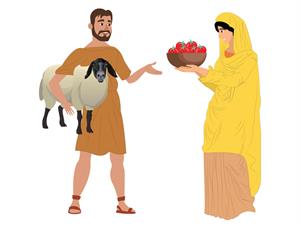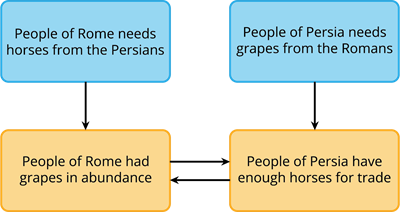
PUMPA - SMART LEARNING
எங்கள் ஆசிரியர்களுடன் 1-ஆன்-1 ஆலோசனை நேரத்தைப் பெறுங்கள். டாப்பர் ஆவதற்கு நாங்கள் பயிற்சி அளிப்போம்
Book Free DemoThe History of Barter System:
The barter system was considered the oldest economic system by which people began to exchange their goods according to their needs. This system dominated the economic scene before the advent of money.
This system was first seen among the tribes of Mesopotamia. In 6000 BC, the Mesopotamian tribes began the practice of bartering. Their adjacent kingdom was ruled by the Phoenicians, who later went on to adopt this practice.
Various commodities were exchanged among the communities based on the requirements at that time. Weapons, food, animals, and spices were commonly bartered among the people.
Salt: The commodity of salt was regarded with the high value among the soldiers of Rome, so they exchanged their services for salt under the Roman Empire.
The barter system was the most predominantly followed economic system of the Medieval and Modern period, which existed till the late 20th Century.
The Practice of Bartering:
This practice was highly prevalent because of the simplicity of its procedure which was easily appealing to the common people. The deal between the parties was concluded with trust playing a pivotal role.

Barter System
Excess or surplus goods produced by one community will be exchanged with the other community that produces goods required for the former community. This forms the basis of the Barter system.
“The Double Coincidence of Wants”:
One of the major problems regarding the Barter system was the “Double Coincidence of Wants” i.e., the trading communities seek the exactly required commodity from the other end to trade their commodity to the latter.
An example of the Double Coincidence of Wants is given below.

In the above Condition, both the communities satisfy the deal of the other community; hence bartering takes place peacefully. If the required commodity is absent from the other community, bartering cannot take place. This precarious situation is termed as “Double Coincidence of Wants”.
Advantages of Barter System:
1. Easily appealing to the commoners.
2. Trust-based exchange of goods.
3. Applicable to all goods produced by the countries.
Disadvantages of the Barter System:
1. Double Coincidence of Wants for the goods.
2. Demanding more goods for exchange.